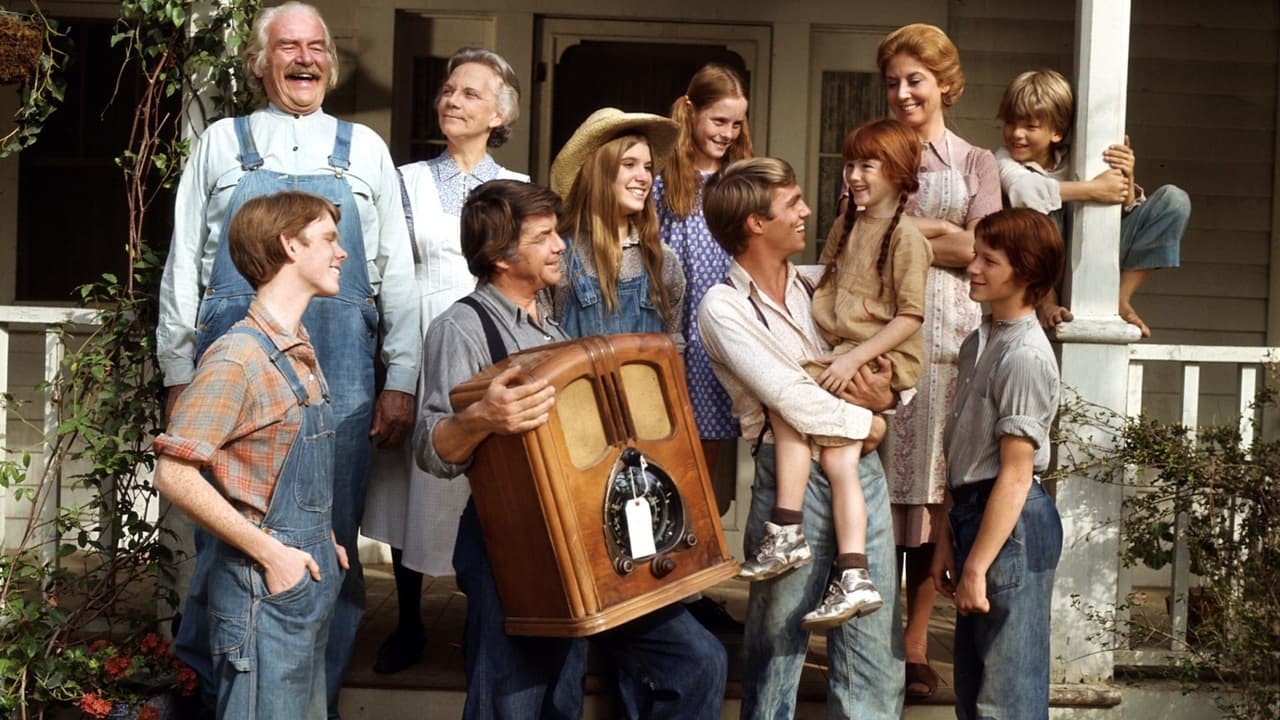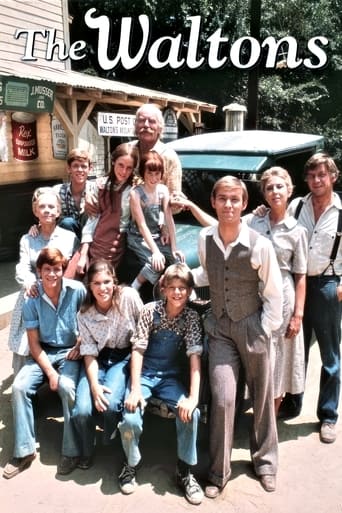

Set during the Great Depression this series follows the life and times of the Waltons. It is made up of four generations who all live on Walton Mountain. Despite displaying sound family values there was always a rather sickly gooiness which seemed to permeate in every single episode. The most annoying part for me was everyone saying goodnight to each other at the end of each episode.Despite it being the depression nobody ever seemed to go short of anything and there was always a huge amount of food o the table. This is really not the way things were and it tries to give out a message that the Lord will provide. This rather vomit inducing moral warmth ruined what potentially could have been a good show.
... View MoreIn the UK, the Waltons was a regular TV feature that marked out the 1970s decade, and - while its story lines contained the contemporary issue of its production time, and sometimes with a grain or two of excessive schmaltz - it remains to this day a remarkable achievement in TV history. I have to admit that my prejudices were foremost in my mind when my Brazilian wife requested me to buy the first four series boxed-set DVDs, and I advised her that I'd buy the first series only to see if she appreciated it before purchasing any more. But I was wrong. She consumed the series and, before long, I was hooked too. Nothing on TV today or or since the Waltons has ever portrayed loving, united and supportive family as courageously as the Waltons. If only I appreciated this when I was a teenager and the series came to a close in the very early 80's. By then, the world and his wife had enough of the Waltons and it was an idea that had outlived its usefulness, giving rise to a number of made-for-TV movies that were generally plot-less and nostalgic. Who would've ever guessed that in a matter of a few decades, after moral decay and worsening family values and a hefty back-catalogue of many TV series that espoused dysfunction and moral ambiguity, that the Waltons would arise like the phoenix from the ashes to entertain families around the world and educate us all in what a loving and united family looks like.There are several comments that denounce the Waltons, because of its unrealistic portrayal of the Great Depression. They have a point - but nobody really knows how Virginian farming-community families lived during the Great Depression, because all we have are the novels and newspaper reports that focus on the drama and tragedy. In truth, the Waltons indeed do seem to be saved financially at the ninth hour by some act of compassion or sacrifice. But this is the whole point of the show. Unlike today's self-centered, egotistical, morally ambiguous solutions popularized by today's TV shows, the Waltons wasn't about portraying the Great Depression realistically, but about portraying wholesome family life. Sure, maybe such a family is a myth, but it's one worth aspiring to.However, we mustn't forget that The Waltons depicted not only the Depression but also the struggle to survive for farming communities during the War Years, when the US industrialized. This is often overlooked, but is worth mentioning as it provides a backdrop of a historically important developments in US history. The Waltons simply portrays a world and time that has disappeared.Every episode is jam-packed with heart and compassion and the Waltons overcome their ordeals through respect and understanding.It's worth pointing out to the 'realists' out there that the show's pilot is a much more authentic portrayal of the Great Depression, centering around the theme of John Walton returning home through the ice and snow from Richmond to spend Christmas with his family. In that pilot episode, John-Boy and the children are acted by the same cast, however Olivia Walton and John Walton are played by different actors. Throughout the 90-minute screenplay, John-Boy is shown to be wracked by self-doubt and fears for his father's safe return in time for Christmas. The children are lost and forlorn and toil through the wintry conditions. Olivia Walton is haggard, nervy and verging on mental collapse - her character is portrayed as dark and regretful and morose. The entire pilot episode jars the soul and fails to unite as seamlessly as the subsequent series did. It took guts and vision to the producers and sponsors to back the series on the basis of that pilot, and real insight to re-cast Olivia and John Walton and polish up the scripts to focus on functional rather than dysfunctional family life.Nobody needs reminding of how terrible the Great Depression was or how the evil banks exploited the poor and desperate. We have enough reminders about these facts today. And it's probably a sad fact that even the cast of the show had family-lives that were poor reflections of those they played in the Waltons. Even so, what people need is to see something good and praiseworthy and beautiful, something they can aspire to, rather than earthy, visceral and pessimistic. Nobody created the Waltons to address the sins of the Depression, but to deliver a show about a family where every member of the family is loved, not just by the fictional characters, but also by the viewers. I have to confess it is amazing how at home I feel when I watch an episode and how familiar the Waltons feel to me, almost as if they're extended family to me. Perhaps this is the real genius of the show and why there are so many faithful followers of the show who visit conventions, Waltons Mountain (in California!), and write to the cast and plead for more reunion TV appearances. Sure, I see the odd moment of schmaltz or social commentary, but I recognize it and ignore it in favour of the wholesome values the show espouses.The Waltons is a gem of TV production that - like good wine - had to stand for a few years before it matured into the product that many value. It deserves to be remembered, re-watched and applauded in the annals of good TV for the sake of generations yet to come. Buy it while you can and cherish it. Future generations will probably become parents who believe that Desperate Housewives, the Sopranos, Confessions of a Call Girl, Six Feet Under, Buffy the Vampire Slayer, and Cold Case are family-friendly, wholesome productions.
... View MoreOne of the most air-headed comments over the years has been "This series does not in anyway depict the average depression era family." I heard this comment just recently by a talk show host talking about 70's TV shows. Well, duh!, it depicts the depression era family of Earl Hamner the show's creator and has nothing to do with "the average depression era American family." How even some supposed TV critics came up with that for a reason to be negative against the show has always puzzled me. The show was as I understand it true to life for the area around Schuyler, VA., the home of Earl Hamner. A couple of the characters on the show were composites of his actual siblings (he had one more sibling than the Waltons). A special that aired in the late 1970's united his real brothers and sisters with their TV counterparts. The program is hugely successful worldwide and I'm glad that most comments are by and large supportive of the show and always have been save for that few who can't get their facts straight.
... View MoreThis show is about a large rural family during the Great Depression and WW II set in the Blue Ridge Mountains. When the show starts out most of the kids in the family don't wear shoes. The episodes with Richard Thomas as John Boy Walton are the strongest. He plays the oldest of the Walton children, who wants to eventually leave the family home so he can become a writer who wears shoes. Eventually Richard Thomas leaves the series presumably because he was tired of people coming up to him on the street and saying, "Aren't you, John Boy?" After Richard Thomas' departure the series loses its focus a bit, but the kids end up wearing shoes more often. Eventually most of the adult figures of the Walton household vanish under somewhat mysterious circumstances and the kids have the whole house and mountain to themselves. At this point they are wearing shoes all the time. The last episode has them throwing a giant party featuring ten kegs of beer and an unlimited supply of the Baldwin sister's recipe. Okay, The Walton kids would never throw a kegger, but it is still a warmly entertaining show to watch, especially during the shoeless years.
... View More